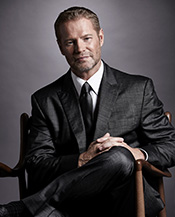There is no doubt, the recession changed the automotive industry, however, the real game changer may actually be found in the new post-recession consumer mindset, demographic shifts and how automakers are responding.
 Check out the Personalized Fuel Efficiency App Challenge.
Check out the Personalized Fuel Efficiency App Challenge.
According to Jim Farley, the executive vice president of Global Marketing, Sales and Service and Lincoln, as everyone is breathing a sigh of relief about sales levels getting back to normal, he says, “the real news is that the great recession has dealt a fundamental change to the consumer’s mindset.” He adds, “The question of whether consumers are returning to the market is settled. Now the question is, ‘What do they want and expect from us, and are we really ready to respond to what has just taken place?’”
Farley shared those thoughts during his keynote address at the 2013 New York International Auto Show. The recession has influenced how consumers decide to make purchases and what they value an automobile. He shared several post-recession trends that he believes will drive industry change – shifting expectations around luxury, the rise of women and Hispanics, a renewed focus on fuel economy and the rapid proliferation of mobile platforms.
Great Luxury Expectations
Luxury is now no longer defined simply by price, size and exclusivity. Farley says, “Now, people are breaking the association of luxury with a high price tag,” He says they are looking for the same luxury quality, performance and features in smaller vehicles at more reasonable prices.
Women, Hispanics Transform Market
Baby boomers will continue to have the greatest influence over the market for many years to come, however, Farley pointed to a shift among women, Hispanics as well millennials as a big role player in the marketplace in years to come.
One of the most powerful trend will likely be found in the rising consumer power of women across the globe. “More than 1 billion women will enter the middle class globally by 2020, and many will be buying vehicles for the first time,” Farley said.
Rapid urbanization is drawing women to cities all over the world. There they are trading agricultural work for professional careers. In the United States, women are outpacing male buyers for the first time ever.
Hispanic households are becoming increasingly more affluent with a 126 percent increase in U.S. Hispanic households making more than $100,000 a year. Hispanic households are a total net worth of more than $500 billion.
Behold the Power of Mobile Platforms
Mobile devices are a big player in the new landscape of the automotive field – from marketing and shopping to the actual in-vehicle experience. Farley says that the automotive industry needs to learn to think like their customers. “Most of us recognize that mobile is a power enabler for customers, putting them in control of the shopping process and changing their expectations around connectivity.”
Did you know?
Nearly one in seven people worldwide now uses a smartphone, this has significant influence on the auto industry.
Doug Frisbie, the Facebook head of Automotive Vertical Marketing, joined the keynote presentation and shared how successful businesses in every industry – including automakers – put people at the center.
“Cars were a step change in giving society the ability to stay connected and engaged with the people they cared about,” he said. “The opportunity at hand today is not about phones or social software in cars.”
Brendon Kraham, Google director of Global Mobile Sales and Product Strategy, joined in, as well. He added that the in-car mobile experience will soon be integrated into all the devices consumers use to stay connected.
“Automobiles will soon become a seamless part of the consumer mobile experience,” Kraham said. “It will enhance the experience. When your dash becomes a seamlessly connected screen, it truly becomes a more important, integrated part of your life.”

Fuel Economics
One of the greatest cross-demographic shifts since the recession is the growing number of people who now focus on a vehicle’s fuel economy. It is now one of the the top considerations when buying a vehicle.
Farley said, “We now have a torrent of ‘best-in-class’ claims hitting consumers from all sides, and it’s starting to become noise,” He says with so much information it can be overload and cause confusion as consumers try to make an informed decision. “Given the connectivity in our cars and the proliferation of mobile devices, we have the opportunity to give consumers better and more relevant data to understand what they can expect in on-the-road fuel economy performance.”
Harnessing the power of mobile platforms, Farley announced developers will have access to Ford’s OpenXC connectivity research platform as a sandbox to create and test innovative ideas in the newly announced $50,000 Personalized Fuel Efficiency App Challenge.
Many elements factor into your personalized fuel efficiency including temperature, terrain, traffic and driving styles. The goal of this challenge is to enable drivers to optimize their efficiency on the road and then share that data with others.
More info: http://media.ford.com/article_display.cfm?article_id=37864
